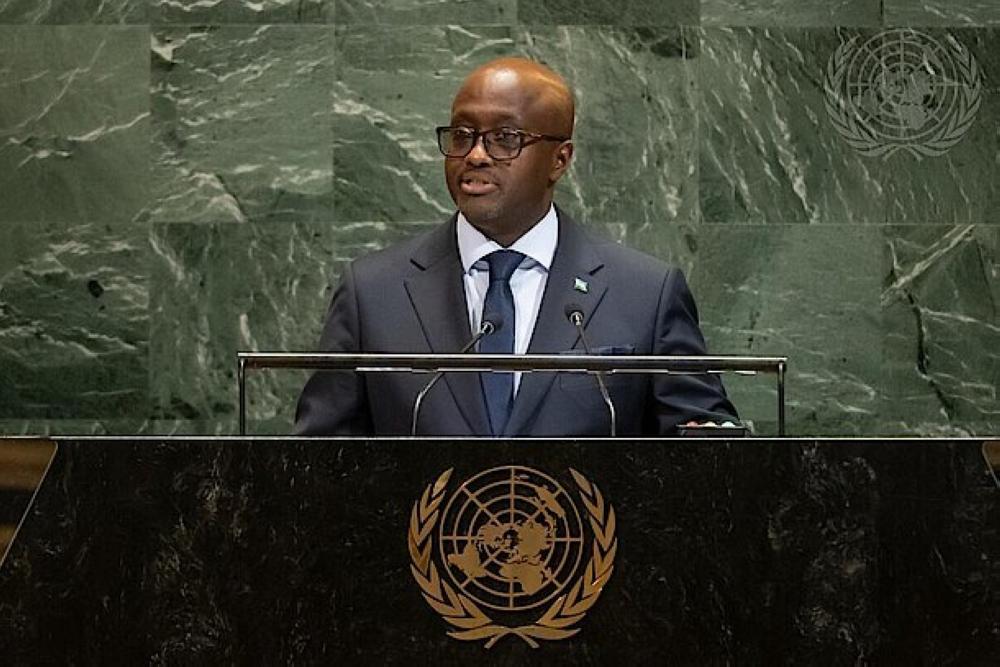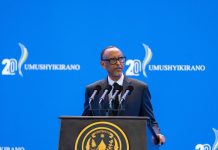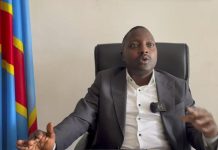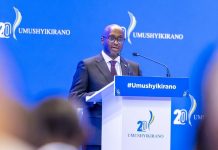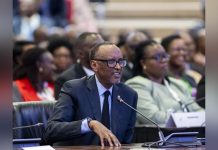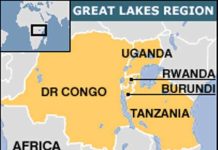Africa-Press – Rwanda. Rwanda’s Minister of Foreign Affairs and International Cooperation, Olivier Nduhungirehe, has warned the United Nations against overlooking early signs of genocide in DR Congo, saying violence against the Congolese Tutsi communities must be stopped before it is too late.
Nduhungirehe made the call on Thursday, September 25, as he delivered Rwanda’s statement at the 80th United Nations General Assembly (UNGA) in New York, where world leaders are meeting from September 23 to 29 to deliberate on peace, security, and conflict resolution.
The Minister stressed Rwanda’s deep concern about the persistence of genocide ideology and related crimes in eastern DR Congo and Kinshasa’s support militias groups such as the FDLR, which was founded by remnants of the 1994 Genocide against the Tutsi.
He noted that these crimes said are taking place “under the watch of the international community and the UN itself.”
He urged the UN to go beyond traditional peacekeeping efforts, which Rwanda has long called to be reformed.
“Of particular concern to Rwanda is the emergence of Wazalendo militias, armed and supported by the Congolese government, which are committing countless abuses, including burning down whole villages of Congolese Tutsi, lynching and burning alive civilians and military officers, as well as arming children for ethnic cleansing,” Nduhungirehe said.
“Peacekeeping alone is not enough. Too often, we deplore relapse into conflict because its root causes were not properly addressed. Prevention, mediation, and effective peacebuilding must be our first resort.”
“The targeting, persecution, and massacre of Congolese Tutsi, including the Banyamulenge community, amounts to crimes against humanity which have all the early warning signs of a Genocide,” Nduhungirehe warned.
He said the brutality, methods and ideology used in eastern DR Congo today “bear an alarming resemblance to that of the genocidal militias of 1994 in Rwanda.”
“Strong action is needed to put an end to this dangerous development before it is too late,” he said.
Nduhungirehe also denounced attempts to minimize the crisis in DR Congo, noting that no political denial could alter the reality of atrocities being committed.
“In this regard, no amount of calculated cynicism can rewrite the truth and recast perpetrators as victims, or victims as perpetrators. These are denialist behaviors often deployed by perpetrators,” he said.
He emphasized that financing and providing weapons to groups with a genocidal history and ongoing intent is nothing less than complicity in the crime itself. “If there are crimes in the DR Congo committed for economic gains, they have clear names: Those are corruption, bad governance, and the embezzlement of public funds.” Nduhungirehe said.
“Genocide follows a pattern. It follows clear stages. It is not an umbrella term; it is defined by international law. Genocide targets a specific group for who they are, with the intent to exterminate them as such.”
Nduhungirehe reiterated that Rwanda’s objective has always been the security and wellbeing of its citizens and the Great Lakes region, stating that “the current conflict in eastern DR Congo is not new. It is rooted in decades of bad governance, marginalization and persecution of minorities, genocide ideology and a persistent colonial legacy.”
Since signing of peace agreement, progress has been slow
While acknowledging international efforts to facilitate peace between Rwanda and DR Congo, including the US, African Union, and Qatar, the Minister expressed concern about the slow progress in implementing the peace agreement signed in Washington in June.
He noted that the agreement provides for a comprehensive framework encompassing security, political, and economic components, and yet, “progress has been moving slowly.”
“While promising meetings are taking place in Washington to implement the June Peace Agreement, the situation on the ground remains deeply troubling,” he said.
“DR Congo’s renewed militarization, coupled with its continued collaboration with genocidal and UN-sanctioned armed groups such as the DRC-backed FDLR and Wazalendo militias, and the deployment of attack drones and fighter jets against civilian populations, particularly the Banyamulenge and other Congolese Tutsi, underscore the gravity of the crisis.”
The Congolese government coalition is supported by foreign forces, including mercenaries, in clear violation of the 1977 OAU Convention and the 1989 UN Convention against the use of mercenaries, he added.
“Rwanda condemns these developments and calls on DR Congo to reject the military solution and implement in good faith the Washington Peace Agreement which is a golden opportunity to end this conflict that has lasted for far too long.”
Reflecting on the United Nations’ longstanding role in DR Congo, Nduhungirehe recalled that the UN mission in DR Congo (MONUSCO) has been present in the country since 1999 with a robust mandate. However, he argued that its presence has not achieved the intended results.
“Despite its efforts, the mission has not succeeded in halting the proliferation of armed groups, especially the eradication of the DRC-backed FDLR,” he said.
“Instead, MONUSCO has ended up working alongside a military coalition that includes the FDLR, going against more than twenty Security Council resolutions calling for the neutralization of that group. There is an urgent need to review the legal conformity of MONUSCO’s mandate.”
The Minister reaffirmed Rwanda’s commitment to multilateralism and the strengthening of the United Nations as a force for justice, peace, and sustainable development.
“While the challenges and solutions for multilateralism are clear, it is political will that must guide us today to build a UN fit for purpose. Human rights are a major pillar of the United Nations. Rwanda rose from the ashes of the Genocide in 1994 by placing human dignity, unity, and accountability at the center of our governance,” he said.
“Together, we must build an organization capable of addressing the needs of billions across the globe, tackling human rights abuses, climate change, and responding to an increasingly interconnected world for successive generations to come.”
For More News And Analysis About Rwanda Follow Africa-Press

